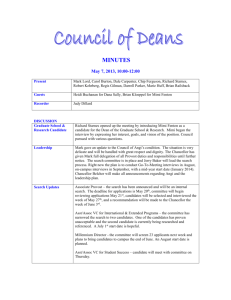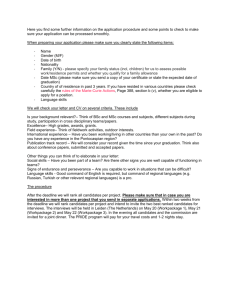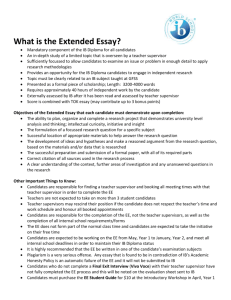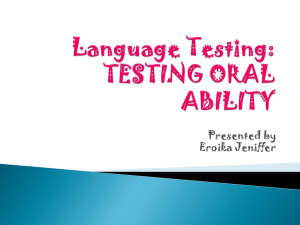MINNESOTA STATE COLLEGES AND UNIVERSITIES
advertisement
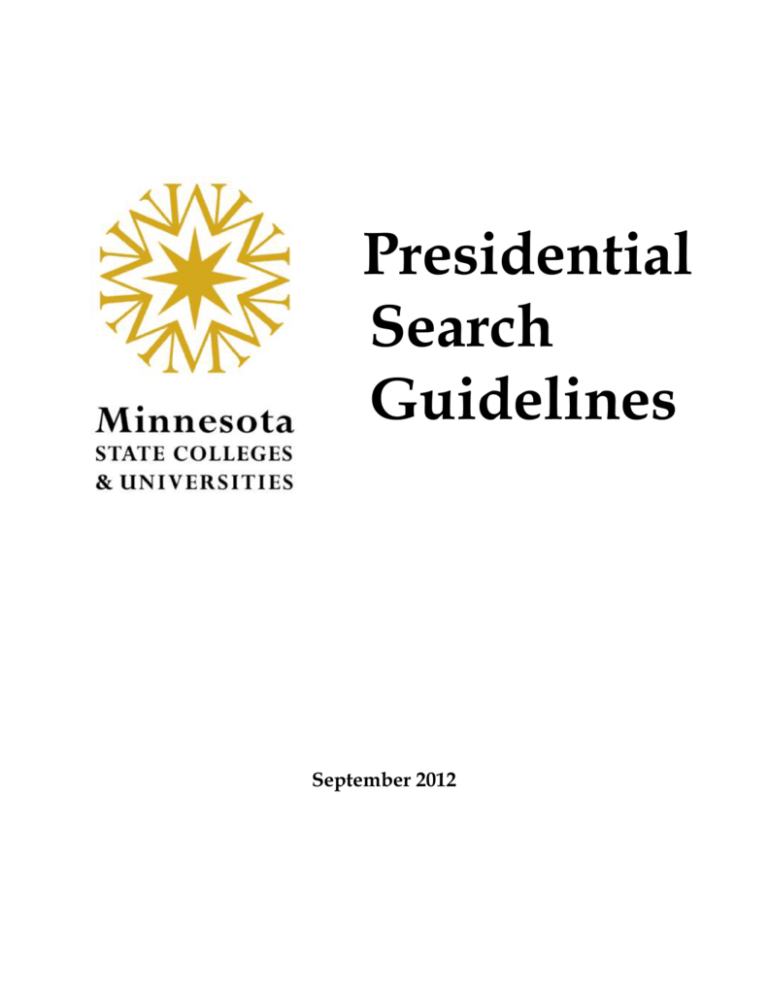
Presidential Search Guidelines September 2012 Minnesota State Colleges and Universities Presidential Search Guidelines Purpose This process applies to the recruitment, nomination, evaluation, and recommendation of candidates for the presidencies of Minnesota State Colleges and Universities. Implementation of these guidelines shall be consistent with Board Policy 4.2 Appointment of Presidents. Exclusion of Candidates No presidential candidate may participate in any subsequent step of this process. College or University Search Advisory Committee Purpose The committee is advisory to the chancellor. The committee performs those responsibilities that the chancellor requests. Typical responsibilities include recruiting candidates, screening applications, interviewing candidates off-site in confidential interviews and conducting an on-site public interview process of a small group of candidates. The committee provides feedback to the chancellor from those interviews. Chair The chancellor will appoint a chair of the search advisory committee who will provide leadership and facilitate meetings and interviews. The search chair serves as the primary liaison to the chancellor to ensure that the work of the committee is conducted with the interests of the system in mind, particularly as it relates to diversity and EEO principles. Ex-Officio Members A campus liaison will also be appointed to assist the search chair in the planning and organization of committee meetings and candidate interviews. This liaison is typically the chief human resources officer from the campus. A system office liaison will be appointed. The liaison will have administrative responsibility for the presidential search and will maintain all records and correspondence for the search. 1 1-1 Regular Members The chancellor shall appoint members of the search advisory committee in consultation with the search chair and the vice chancellor for human resources. The committee members shall be knowledgeable about the duties and responsibilities of the position of president and should be broadly representative of the interests of the Minnesota State Colleges and Universities system, college and university groups and community stakeholders. In selecting committee members the chancellor will make every effort to fully incorporate equal opportunity and diversity principles. Search Consultants The system office may engage the services of an executive search consultant. The consultant will assist with recruitment and evaluation of candidates. Neither the consultant nor any member of the search advisory committee shall engage in any negotiation of salary or other employment terms with any candidate, unless specifically authorized to do so by the chancellor. Initial Screening The system office will conduct an initial review of each candidate’s materials to determine their viability as a candidate for searches during the year. The goal of this initial review is to screen out candidates who do not meet the minimum qualifications, ensure a diverse pool of applicants, and ensure that the search advisory committee is spending its time on viable candidates. The initial screening will use the position announcement and profile developed, as well as criteria which consider both the experience and competencies necessary to move the college or university ahead in the future. The system office will refer qualified candidates to the college or university search advisory committee for further consideration. General Search Procedures Announcement A presidential vacancy announcement, inviting applications and nominations, shall be advertised by the search firm, in consultation with the system office. The notice of vacancy, containing the responsibilities, skills, abilities, and qualifications for the position, shall be available to all persons making application or who have been nominated for the presidency. Profile A comprehensive profile of the position will be developed to assist with recruiting candidates. The system office liaison will work with the campus liaison, college or university staff, search consultant, search chair and others to develop the profile. 2 1-1 Equal Opportunity and Affirmative Action The Minnesota State Colleges and Universities is an equal opportunity employer. All aspects of the search process shall be conducted in accordance with equal opportunity principles and affirmative action guidelines. Affirmative techniques will be used to enrich the candidate pool and ensure diversity. Confidentiality and Access to Information Confidentiality in the search process is essential to supporting a successful search and complying with state law regarding privacy of applicant information. Search advisory committee members are required to maintain strict privacy of all applicant data received in the search process. In accordance with Minnesota Statute 13.43, Subd.3, only those candidates chosen to be interviewed by the appointing authority (that is, the Board of Trustees) are considered finalists. The release of information about semi-finalist candidates will be made by the search chair or campus liaison after consultation with the chancellor and system office liaison and only after receiving a signed release from the candidate. Applications and nominations All candidates applying for or accepting nomination for the position of president within the Minnesota State Colleges and Universities system must provide a letter of application and current resume or otherwise make application in a manner which provides all necessary information. Each candidate must also provide the names and contact information of at least three professional references. Candidates proceeding to the interview stage will be required to agree to have both on and off list references checked, and sign a release form authorizing this to take place. A search firm, retained by the system office, will process all the applications and nominations of candidates, and will notify all candidates upon receipt of materials. Evaluation Materials All rating forms and written materials used by the search advisory committee during the evaluation and interview process shall be retained in a secure manner. Upon completion of the search, the system office liaison will retain all materials consistent with the system records retention schedule. Off-site interviews A short list of candidates will be interviewed by the search advisory committee in a confidential location. The search chair, in consultation with the consultant, system office liaison and committee, will develop a list of behavioral-based questions which will be asked of each candidate during off-site interviews. At the conclusion of the interviews, the search advisory committee will provide feedback and audiotapes from the interviews to the chancellor. 3 1-1 The chancellor will review audiotapes and consult with the search chair and system office liaison about the search advisory committee feedback and initial referencing information. The chancellor will determine which candidates proceed to the on-campus interviews. On-Campus Interviews The search chair, in concert with the campus liaison and system office liaison, shall be responsible for planning public on-campus interviews. Any member of the college or university community participating in an on-campus interview may complete a feedback form and submit it to the search chair. The campus liaison will coordinate the collection and compilation of all feedback. The search chair shall provide a summary of the feedback to the chancellor regarding candidates interviewed on campus. This summary will include information gathered about the candidates from all phases of the process, including the off-site interviews, on-campus interviews, reference and background checks. Chancellor Interviews The chancellor, with at least one (1) and up to three (3) members of the Board of Trustees, will interview any or all of the candidates forwarded by the search advisory committee. Candidates will also be interviewed by system office staff and others at the request of the chancellor. Recommendation to the Board The chancellor will recommend a finalist for president of the college or university to the Minnesota State Colleges and Universities Board of Trustees. Appointment Appointment of the president shall be made by the Minnesota State Colleges and Universities Board of Trustees. Revised 9/12 4 1-1
